Grant Morrison’s Superman: Work Boots or Jackboots?
By Andy Frisk
September 6, 2011 - 22:44
DC Comics
Okay, what’s done is done. The GenX Superman is gone. Doomsday, Lois and Clark, and all that was great about the Superman of 1986-2011 is gone as well. The DCnU Superman is now here, and the ‘shroom consuming, psychedelically shamanistic, working class/punk rock street thuggish, and all around great writer (if you don’t count the Batman stint) Grant Morrison is in charge of the DCnU Superman’s early hero days. A new day is dawning for Superman, and it’s time to look forward to what his new adventures will have in store for Action Comics (2011) readers…by looking back. This new working class boots and jeans wearing Superman is an outsider, a law breaker, an ultimate justice seeker, and is an all around “champion of the oppressed.” I place that phrase in quotation marks because it is quoted directly from the pages of Action Comics #1 (1938). Everything old is new again in the DCnU, including its 1990s looking artistic style and costume revamps, but Morrison’s take on Superman is a throwback that I can stomach, partly because I honestly have no choice but to, but partly because it is going to be interesting to see how this new Superman plays out in the public’s consciousness. It’s also going to be interesting to see how Morrison repeats, and updates, the old political and class conscious Superman theme, and make no mistake, this new Superman is going to be highly politically charged. We haven’t seen this type of Superman since the late 1930s, so many readers will undoubtedly see this political/class war take on Superman as “fresh”. Long term Superman fans who have read almost every Superman story and book published (the 1930s stories are available in The Superman Chronicles Vol. 1 and 2) might not view these stories as thematically “fresh,” but with seeing as how these new stories are set in contemporary times, they will have a “fresh” setting. A Superman who acts outside the law, and pursues his own form of justice will definitely be different to a contemporary reader, but also has the dangerous potential to simply end up being a character who feeds off of the currently vitriolic, and potentially dangerous, political divisiveness now affecting American politics to the detriment of the country. The Superman of the 1930s appealed to many Americans’ sense of disenfranchisement economically and politically since America was living through the death throes of the Great Depression. The Superman of the 2010s has the potential to do the same, since America is suffering the aftereffects of the Great Recession, but the political climate is much more dangerous now, and this Superman needs to walk a very thin line…
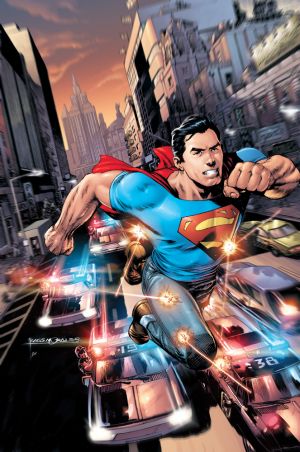 |
A Superman who pursues justice outside of the law, and to his own tune, can be dangerously misconstrued as a hero of a far right and fascistic moral intolerance whose sense of self pursued justice rings dangerously of intolerant lawlessness. A Superman who champions the working class, and attacks capitalistically lawless robber barons only, emanates a foul far left and socialistic odor. While there is a general, and ludicrous, disconnect in the populace that abhors Bernie Madoff types while championing the same system that allows such types to flourish (kind of like Michelle Bachman staunchly advocates states rights—except in cases that she deems the central government to have the final say on, like abortion rights), allowing this “new” Superman to speak to strongly to either side of the extremist political spectrum, or dangerously engage in the tactics of both, will pretty much destroy any and all credibility that Superman, as a character, has a diversely uniting figure. In other words, Morrison needs to exercise great care in how he presents this new, “outside the law” Superman. His work boots can easily be seen as jackboots and vice versa. Morrison is a talented and well seasoned writer, so hopefully he’s already considered this potential dilemma. Again, it will be interesting to see how he plays with the dangerous political dichotomies that he will be setting up with his take on Superman thematically. While we honestly don’t really know yet exactly how Morrison is going to play this one out, we can glean a bit of insight from the few pages of Action Comics (2011) #1 that we were privy to prior to its release on Sept. 7th 2011. (Images can be enlarged below as well.)
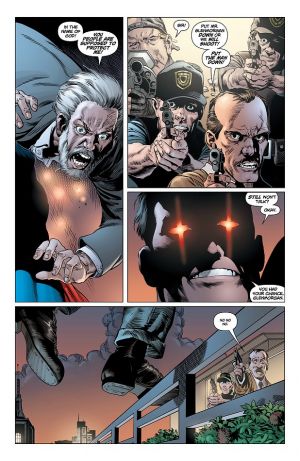 |
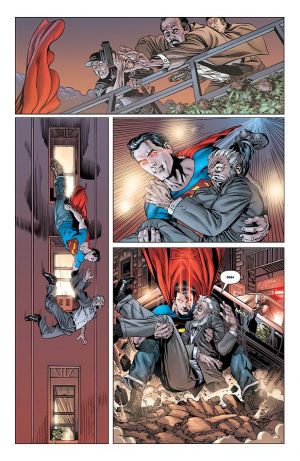 |
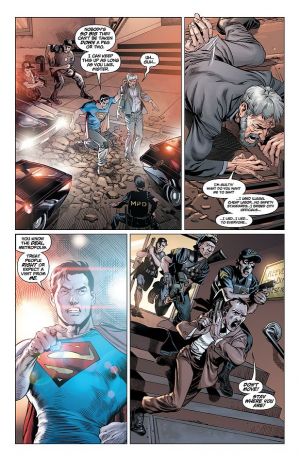 |
The above three pages pretty much illustrate the point I’m driving at here. Superman is breaking the law by terrorizing a criminal businessman into confessing his illegal abuses towards his working class employees. Superman is championing workers rights, a class war based, and easily misconstrued, socialistic action. He is using fear as a tool, and the power that he possesses as a Nietzschean “Superman,” to achieve his goals, which can easily be misconstrued as a fascistic action. Fear will get anyone to do anything that one desires one to do, and it is often the tool of the far right. The political sensibilities of the reader can construe this Superman into a champion of his or her own political beliefs. Regardless, both actions are of an extreme nature, and advocate a certain amount of extremist action. Granted, it would be much more boring to show Superman, in the guise of Clark Kent, engaged in lawful investigative reporting action in order to bring the criminal capitalist to justice. It is much more emotionally satisfying, and action packed, to see Superman simply grab the evil robber baron and leap from a tall building with him in order to garner a confession. These are superhero comics after all, and the broad appeal of a character such as Superman is superhuman feats performed in the pursuit of justice.
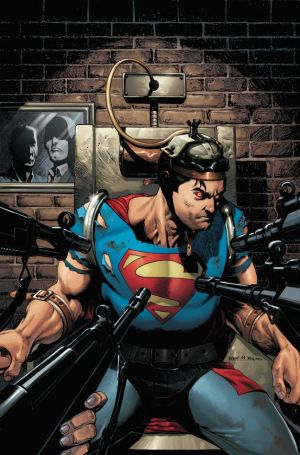 |
This Superman seems to be devoid of moderate and centrist sensibilities. A balanced Superman would use his identity as Clark Kent to investigate, and bring to light legally, the criminal businessman’s actions, after which he would use his powers as Superman to apprehend the villain when he tries to illegally flee justice. These are actions befitting a politically mature, as well as emotionally mature, Superman. Grant Morrison has made it clear though in interviews around the web that he is writing the story of a young and brash Superman. What he is most likely leaving his readers to figure out is that not only is this Superman young and brash, he is politically and ethically immature as well. This is all, most likely, by design since Superman is purposefully being portrayed as so young here. Morrison is too insightful, and politically conscious, a writer to be portraying this Superman as a poor mixture of extremist ideology unintentionally. At least let’s hope so. The Superman of the 1930s grew beyond his immature politics. Let’s at least also hope that the Superman of the 2010s does as well.
|
|
Related Articles:
Superman 2025 Movie Review
DC Classic Multiverse Superman and Page Puncher Superman Review
Le langage kryptonien de Superman dans le film Man of Steel : une analyse de la théorie des médiums
Retro Review: Superman (1988)
That Time Canada Claimed Superman for Stamps Collectors
First Appearance Superman Action Figure (2004)
So Superman Is Bisexual?
Review: Superman: Up in the Sky #2
Review: Superman’s Pal, Jimmy Olsen #1
Review: Superman #13



